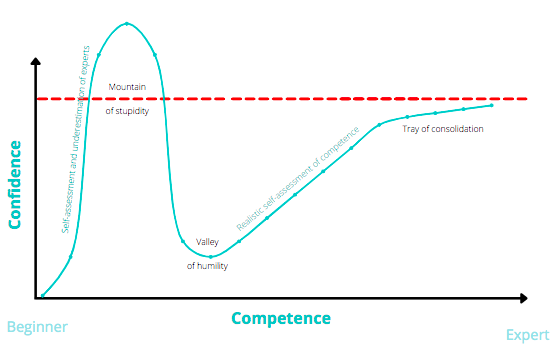The Dunning Kruger effect or the issue of overconfidence

What is the Dunning-Kruger effect?
There are all kinds of “biases” in the way we think. Many are little arrangements we make with ourselves to help us navigate this complex world. We are all affected. The Dunning Kruger effect is one of them.
This cognitive bias consists of people who are low-skilled on a subject, being convinced that they are very qualified in it (while those who are most skilled tend to underestimate themselves).
Unfortunately, the result of this bias can sometimes have serious consequences, especially regarding the fight against global warming. It prevents us from making necessary decisions to mitigate and adapt to climate change, including collective ones.
“The ignorant asserts, the experts doubt, the wise reflect” Aristote
Dunning and Kruger surveyed a group of students asking them to self-assess in three areas: humor, grammar, and logical thinking. Then, they compared these assessments to the students’ actual skills. The results were clear: the most talented students tended to underestimate themselves, while the less qualified clearly overestimated themselves. How do we explain this “overconfidence” of the least skilled?
Kruger and Dunning drew four conclusions about individuals who are overconfident on a subject:
- They are unable to measure their true level of competence.
- They have difficulty recognizing the skills of those who really have them.
- They are unable to measure their degree of incompetence in a given field.
- After having been trained to develop their skills in a meaningful way, they may be able to recognize and accept their past shortcomings.
An ignorant unaware of their own ignorance
According to Dunning and Kruger, the less knowledge a person has, the less likely he or she is to know that they are ignorant. If you do not know anything about a subject, how do you know that you still have a lot to learn? Conversely, someone who is very knowledgeable will have a better sense of the extent of knowledge that a subject requires, and will be more aware of the fact that he or she is far from completely mastering the subject. In a word, people lacking knowledge do not have the skills to realize that they are lacking. Thus, they do not only overestimate themselves, but they are not able to spontaneously appreciate the skills of others.
We also often tend to confuse self-confidence with competence. A person who looks confident is often perceived as competent.
Darwin “Ignorance more frequently begets confidence than does knowledge”
As we have understood, the Dunning Kruger effect can have serious consequences, especially regarding the fight against climate change.
So, how can the Dunning-Kruger effect be remedied ?
Firstly, we have to confront the person suffering of the “Dunning-Krugerian” with their own faults. Is he or she convinced that they are right? Show them that they are mistaken by using concrete examples and proven facts.
Secondly, show them how another idea could be better. This could be by casually mentioning the last conference you went to or a discovery you made by participating in the Fresk workshop.
How not to overestimate yourself?
- Practice and keep learning!
- Ask other people to assess your level of understanding and give you constructive feedback.
- Question what you already know: beware of confirmation bias (which leads us to consider sources that confirm our point of view as a priority (articles, books, etc.) ).
- Always think about extending your circle of competence by attending scientific conferences, reading books stc..
- Read the Newsletter regularly, attend Fresk’onferences, and move forward on the Fresker’s Journey!
On the other hand, do not underestimate yourself either.
As much as it is important to be aware of your limits, it is also essential to take the full measure of your capacities, and to be confident in asserting yourself when you know that your reasoning is accurate and consistent.
It should be noted that these studies were mainly conducted in western countries. A study conducted in East Asia suggests an opposite effect.
To go further on the subject :
- Kruger, Justin & Dunning, David. (2000). Unskilled and Unaware of It: How Difficulties in Recognizing One’s Own Incompetence Lead to Inflated Self-Assessments. Journal of Personality and Social Psychology. 77. 1121-34.
- Atir, S., Rosenzweig, E., & Dunning, D. (2015). When Knowledge Knows No Bounds: Self-Perceived Expertise Predicts Claims of Impossible Knowledge. Psychological Science, 26(8), 1295–1303.ge
